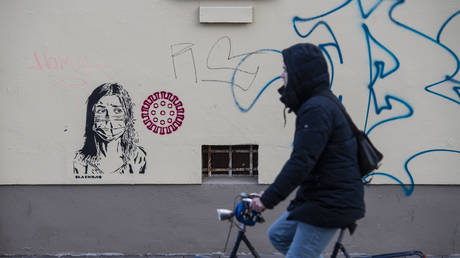
Berlin could discuss easing restrictions on businesses and public life as early as next week, Chancellor Angela Merkel said, adding that progress has been made in the coronavirus fight but warning it could yet prove fleeting.
Berlin could discuss easing restrictions on businesses and public life as early as next week, Chancellor Angela Merkel said, adding that progress has been made in the coronavirus fight but warning it could yet prove fleeting.
“The curve is flattening out,” Merkel said of Germany’s fight against Covid-19 ahead of Easter. She believes the number of new confirmed cases gives “cause for cautious hope.”
Almost 5,000 new cases have been registered with the government’s central public health body – the Robert Koch Institute – over the last 24 hours, while almost 250 people died from the disease over the same period of time.
Still, Merkel said that no additional quarantine measures are required. She thinks her cabinet could discuss relaxing some of the most severe restrictions on public life and business activities as early as next Wednesday, after it has received another comprehensive report on the situation from the German Academy of Sciences.
Even if Berlin follows through on its plans, it will only proceed in small steps, the chancellor warned, cautioning those who might be too eager to finally leave the quarantine behind. “We must not be reckless now. We have to stay focused. The situation is fragile,” she said, warning that “we can ourselves destroy what we have achieved very quickly.”
Earlier, Germany’s Health Minister Jens Spahn also said that many restrictions could be eased in the coming weeks, but the lockdown would stay in place at least until the end of Easter. The minister added that some “social distancing” measures would also remain in force for months to come.
The total number of confirmed coronavirus cases in Germany has surpassed 108,000, while more than 2,100 people have died from the disease.
Still, it appears that Germany is faring better in its fight against the epidemic than some other European countries – such as Italy, Spain and France, where the coronavirus-linked mortality rate is considerably higher.
Yes to ‘solidarity’ but no to ‘coronabonds’
In her speech, Merkel once again called on the European Union’s members to unite in the fight against the pandemic, promising that Germany would play its part in ensuring pan-European solidarity. The chancellor stressed that an economic stimulus program should be discussed, together with a future EU budget.
“And Germany is ready for this solidarity and committed to it. Germany’s wellbeing depends on Europe being well.”
Still, solidarity or not, she flat-out rejected common eurozone bonds to mitigate the economic damage suffered by the likes of Italy and Spain because of the Covid-19 outbreak. Berlin has been blocking the ‘coronabond’ aid package proposed by the EU – a measure particularly supported by Italy – as Germany seemingly seeks to avoid tying itself to the debt-stricken nations.
“You know that I don’t believe we should have common debt because of the situation of our political union, and that’s why we reject this,” Merkel said.
Think your friends would be interested? Share this story!




